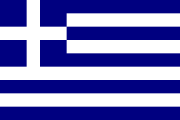Hymn to Liberty
Ὕμνος εἰς τὴν Ἐλευθερίαν
| English: Hymn to Liberty |
| Ýmnos is tin Eleftherían |
| National anthem of |
 Greece Greece
 Cyprus Cyprus |
| Lyrics |
Dionýsios Solomós, 1823 |
| Music |
Nikolaos Mantzaros |
| Adopted |
1865 by Greece
1960 by Cyprus |
|
| Music sample |
|
Hymn to Liberty (Instrumental)
|
The Hymn to Liberty (Greek: Ὕμνος εἰς τὴν Ἐλευθερίαν, Ýmnos is tīn Eleftherian) is a poem written by Dionýsios Solomós in 1823 that consists of 158 stanzas and is the longest national anthem in the world, set to music by Nikolaos Mantzaros. In 1865, the first two stanzas officially became the national anthem of Greece and later also that of the Republic of Cyprus. According to the Constitution of Cyprus, the Greek national anthem is used in the presence of the Greek Cypriot president (or other Greek Cypriot), and the Turkish national anthem is used in the presence of the Turkish Cypriot vice-president. Cyprus stopped using the Turkish national anthem, however, when Turkish Cypriots broke away from the Government in 1963. Hymn to Liberty was also the Greek Royal Anthem (since 1864).
The hymn was set to music in 1865 by the Corfiot operatic composer Nikolaos Mantzaros, who composed two choral versions, a long one for the whole poem and a short one for the first two stanzas; the latter is the one adopted as the National Anthem of Greece.
This anthem has been performed at every closing ceremony of an Olympics, to pay tribute to Greece as the birthplace of the modern Games.
Lyrics
Greek originals
Polytonic orthography
- Σὲ γνωρίζω ἀπὸ τὴν κόψι
- Τοῦ σπαθιοῦ τὴν τρομερή,
- Σὲ γνωρίζω ἀπὸ τὴν ὄψι,
- Ποῦ μὲ βιά μετράει τὴν γῆ.
- Ἀπ’ τὰ κόκκαλα βγαλμένη
- Τῶν Ἑλλήνων τὰ ἱερά,
- Καὶ σὰν πρῶτα ἀνδρειωμένη,
- Χαῖρε, ὢ χαῖρε, Ἐλευθεριά!
|
Monotonic orthography
- Σε γνωρίζω από την κόψη
- του σπαθιού την τρομερή,
- σε γνωρίζω από την όψη
- που με βιά μετράει την γη.
- Απ’ τα κόκκαλα βγαλμένη
- των Ελλήνων τα ιερά,
- και σαν πρώτα ανδρειωμένη,
- χαίρε, ω χαίρε, Ελευθεριά!3
[1]
|
Transliteration
- Se gnorizo apo tin kopsi
- tou spathiou tin tromeri,
- se gnorízo apo tin opsi,
- pou me via metrai tin gi.
- Ap' ta kokkala vgalmeni
- ton Ellinon ta iera,
- kai san prota andriomeni,
- chere, o chere, Eleftheria![1]
|
English Translations
Literal
- I know it's you from the edge
- of the sword, the terrible one
- I recognize you from the look
- which with hardness surveys the land
- drawn from the bones
- of the Greeks, the sacred ones
- and, valiant as first
- hail, o hail, Liberty!
|
Poetic
- I shall always recognize you
- by the dreadful sword you hold
- as the Earth with searching vision
- you survey with spirit bold
- From the Greeks of old whose dying
- brought to life and spirit free
- now with ancient valour rising
- let us hail you, oh Liberty!
|
By Rudyard Kipling (1918)
- We knew thee of old,
- O, divinely restored,
- By the lights of thine eyes,
- And the light of thy Sword.
- From the graves of our slain,
- Shall thy valour prevail,
- As we greet thee again,
- Hail, Liberty! Hail!
|
Notes
- ↑ 1.0 1.1 Last two verses are repeated times in the national anthem.
External links
|
National anthems of Europe |
|
National anthems
of sovereign states |
|
|
National and regional
anthems of other
political entities |
Abkhazia (disputed) · Adygea (Russia) · Åland (Finland) · Bashkortostan (Russia) · Bavaria (Germany) · Brittany (France) · Chechen Republic (Russia) · Cornwall (UK) · Corsica (France) · Crimea (Ukraine) · England (UK) · Faroe Islands (Denmark) · Flanders (Belgium) · Friesland (Netherlands) · Gibraltar (UK) · Greenland (Denmark) · Guernsey · Istria (Croatia) · Northern Ireland (UK) · Jersey · Republic of Karelia (Russia) · Kosovo (disputed) · Lusatia (Germany) · Macedonia (Greece) · Isle of Man · Nagorno-Karabakh (disputed) · North Ossetia-Alania (Russia) · Republika Srpska (Bosnia and Herzegovina) · Romany (Europe) · Sami · Scotland (UK) · Sealand (disputed) · South Ossetia (disputed) · Svalbard (Norway) · Székely Land (Romania, disputed) · Tatarstan (Russia) · Transnistria (disputed) · Northern Cyprus (disputed) · Tuva (Russia) · Udmurtia (Russia) · Wales (UK) · Wallonia (Belgium) · Yorkshire (UK)
|
|
Anthems of former
political entities |
|
|
Anthem of
European Union and
Council of Europe |
European Anthem
|
|
|
National anthems of Asia |
|
- National anthems
Afghanistan · Armenia · Azerbaijan · Bahrain · Bangladesh · Bhutan · Brunei · Burma · Cambodia · People's Republic of China · Cyprus · East Timor · Egypt · Georgia · India · Indonesia · Iran · Iraq · Israel · Japan · Jordan · Kazakhstan · Korea, North · Korea, South · Kuwait · Kyrgyzstan · Laos · Lebanon · Malaysia · Maldives · Mongolia · Nepal · Oman · Pakistan · Palestine · Philippines · Qatar · Russia · Saudi Arabia · Singapore · Sri Lanka · Syria · Republic of China (Taiwan) (disputed) · Tajikistan · Thailand · Turkey · Turkmenistan · United Arab Emirates · Uzbekistan · Vietnam · Yemen
- Regional anthems
Abkhazia (disputed) · Iraqi Kurdistan (Iraq) · Kalmykia (Russia) · Nagorno-Karabakh (disputed) · Turkish Republic of Northern Cyprus (disputed) · Deg o Tegh o Fateh (Sikhs) · South Ossetia (disputed) · Tibet (disputed) · Tuva (Russia)
- Asian Organizations
ASEAN
|
|
 Greece topics Greece topics |
|
| People |
Names · Diaspora · Refugees · Language (Dialects) · List of Greeks
|
 |
|
| History |
|
|
| Law |
Law and order · Supreme Special Court · Court of Cassation · Council of State · Chamber of Accounts
|
|
Politics and
government |
|
|
| Geography |
Regions · Climate · Mountains · Lakes · Rivers · Transport · Environmental issues · Islands · National Parks · List of earthquakes in Greece
|
|
| Economy |
Economic history · Debt crisis · Stock Exchange · Euro · Banks · Bank of Greece · Taxation · Shipping · Tourism
|
|
| Military |
|
|
| Demographics |
Demographic history · Social issues · Religion · Diaspora · Cities · Immigration · Minorities
|
|
| Culture |
Art · Cinema · Dance · Literature · Education · Cuisine · Music · Sport · Television
|
|
| Other topics |
Flag · Coat of arms · National anthem · Evzones · Holidays · Name of Greece · International rankings
|
|
